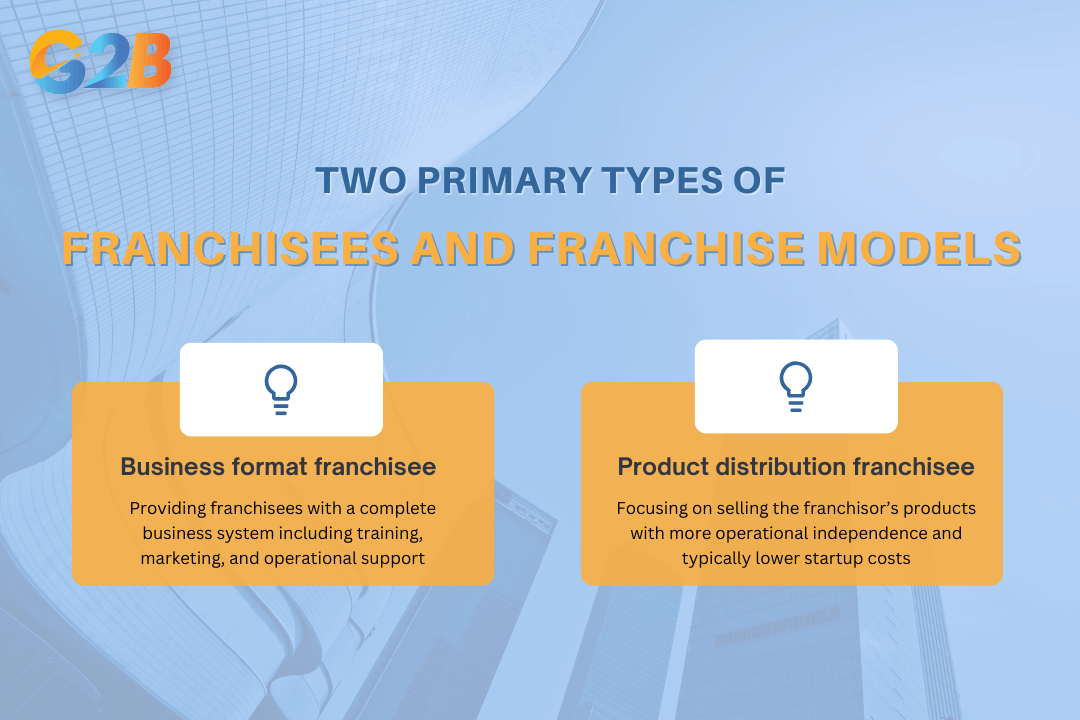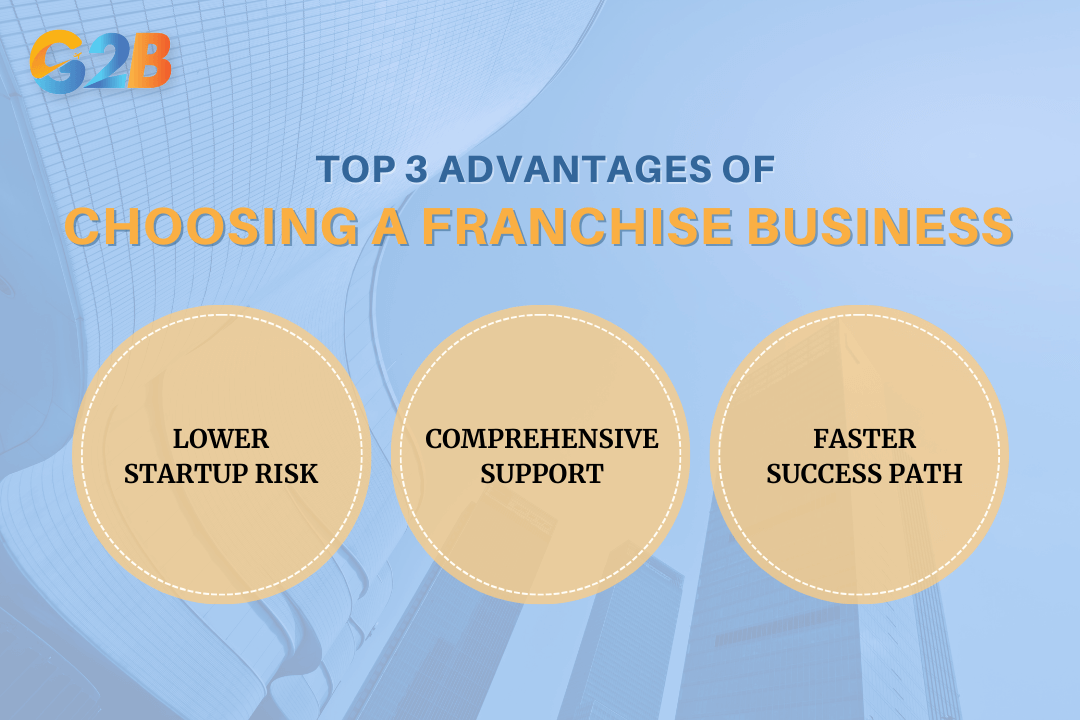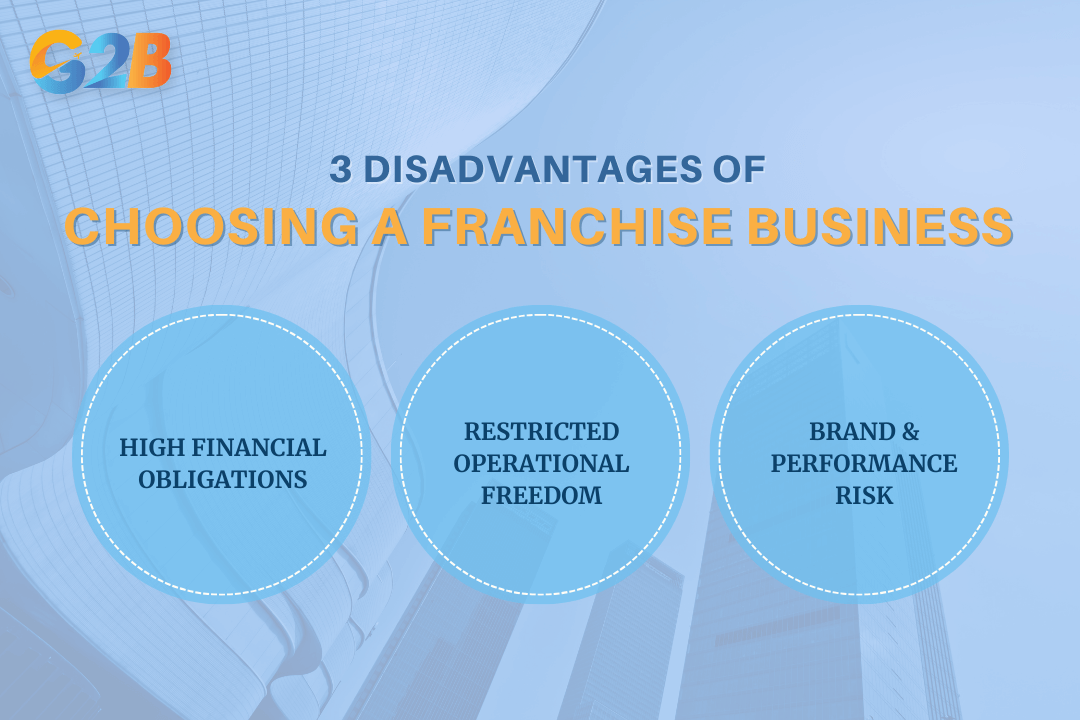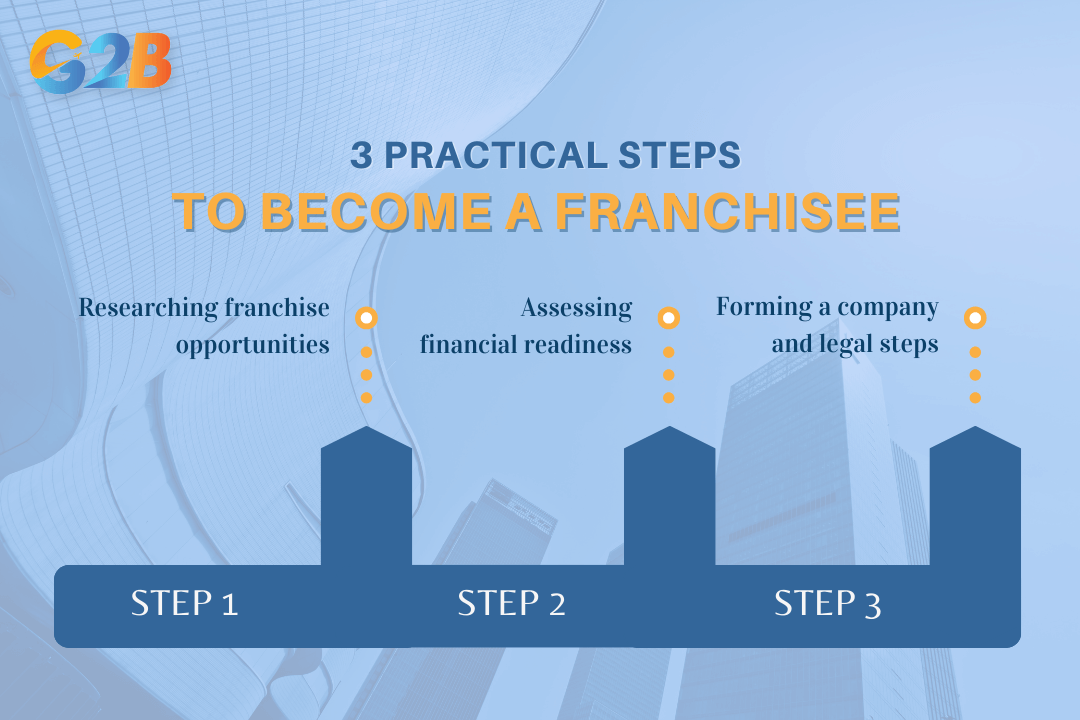Franchisees play a pivotal role in franchisors' expansion plans, offering the local insight and entrepreneurial spirit needed for a franchise to thrive. For those with visions of entrepreneurship, this model offers access to brand recognition and operational support - the gold standard for reducing startup risks. This article will delve into the realm and provide clarity, aiding in informed decision-making and leading the way to potential business success.
This content is provided for general informational purposes to help prospective franchisees and new business owners better understand the fundamentals of franchising. We specialise in company formation and do not offer consulting services on franchise operations. This information is not professional franchising advice, please consult a qualified franchise consultant for personalised guidance.
Introduction to franchising and the role of a franchisee
Franchising represents a business model where franchisees purchase the rights to operate under an established brand's identity and systems. A franchisee functions as an independent business owner while leveraging the recognition and proven methods of an existing company.
What is a franchisee?
A franchisee is legally defined as an independent business operator who has entered into a contractual agreement (franchise agreement) with a franchisor. This binding contract outlines specific rights and obligations that govern the business relationship, including:
- Territory rights and exclusivity
- Duration of the agreement
- Required operational standards
- Training and support provisions
- Fee structures and payment schedules
The franchise agreement forms the legal backbone of the relationship, detailing everything from branding requirements to quality control measures. Within this framework, franchisees maintain their status as independent business entities while operating under the franchisor's trademark and business systems. This distinction proves critical for legal matters such as liability, taxation, and employment issues. Franchise agreements go beyond basic licensing by granting broad intellectual property rights and requiring standardized practices to maintain brand consistency.
Simple explanation for entrepreneurs
For entrepreneurs, becoming a franchisee means buying into an established, proven business formula rather than creating one from scratch, essentially paying for:
- The right to use a recognized brand name
- Access to tested operational systems
- Training and ongoing support
- Marketing assistance and brand recognition
This arrangement requires initial investment fees (typically $20,000-$500,000 depending on the industry) plus ongoing royalties (usually 4-8% of gross sales). While managing daily operations independently, franchisees benefit from the franchisor's experience, avoiding many common startup pitfalls. The franchisor provides the business blueprint and support systems, while the franchisee handles execution, staff management, customer service, and local marketing. This division allows them to focus on growth rather than reinventing operational fundamentals.
After selecting the right franchise opportunity, if you're still unsure about how to establish your business, it’s a smart move to seek professional guidance. G2B offers expert support with Delaware incorporation services to help you navigate the setup process confidently and position your franchise for success.
Real-world examples of franchisees
Franchisees operate across virtually every industry sector, with some of the most visible examples up to 2025 including:
| Industry | Well-known examples | Approximate initial investment |
|---|---|---|
| Fast food | McDonald's, Subway, KFC | $200,000 - $2 million |
| Retail | 7-Eleven, Ace Hardware | $100,000 - $1 million |
| Hospitality | Hampton Inn, Holiday Inn Express | $6 - $15 million |
| Real estate | RE/MAX, Century 21 | $25,000 - $200,000 |
| Automotive | Ford, Toyota dealerships | $2 - $10 million |
The owner of your local McDonald's restaurant exemplifies the franchisee role. They've invested in the rights to operate under the globally recognized brand while managing their specific location's staffing, inventory, and customer service. Similarly, car dealership owners function as franchisees, selling and servicing vehicles under manufacturer guidelines while operating as independent businesses.
Types of franchisees and franchise models
Entrepreneurs looking to become franchisees have two primary models to choose from, each with distinct operational structures and support systems: Business format franchises and product distribution franchises.

Franchisees have two primary franchise models to choose from
Business format franchisee
Business format franchising represents the most comprehensive franchise model in today's market. Under this arrangement, franchisees receive access to the complete business system developed by the franchisor, not just products or brand names.
Benefits when becoming a business format franchisee:
- Complete operating manuals and procedures
- Marketing strategies and materials
- Standardized training programs
- Ongoing operational support
- Quality control systems
The business format model offers significant advantages for first-time business owners. You are essentially purchasing a turnkey business with proven processes. This comprehensive support typically results in higher success rates compared to independent startups, though it comes with more substantial upfront investments ranging from $50,000 to over $1 million, depending on the brand.
Product distribution franchisee
Product distribution franchising focuses primarily on the supplier-dealer relationship. As a product distribution franchisee, the main role involves selling products manufactured by the franchisor, with less emphasis on operational systems.
This model offers:
- Rights to sell specific branded products
- Basic training on product knowledge
- Some marketing support
- Greater operational flexibility
- Lower initial investment (typically)
Car dealerships represent classic examples of this model. Dealerships like Toyota or Ford sell vehicles manufactured by the franchisor but maintain significant control over day-to-day operations. Other examples include soft drink bottlers, gas stations, and appliance retailers. Product distribution franchisees typically experience more independence in their business operations:
- Store design and layout
- Employee management policies
- Local marketing initiatives
- Pricing strategies (within guidelines)
This model appeals to entrepreneurs who desire brand association while maintaining more operational control. However, it typically provides less comprehensive support than business format franchising, requiring franchisees to possess stronger independent business acumen. Both franchise models offer distinct advantages depending on your experience level, financial resources, and desire for operational control as a franchisee.
Roles and responsibilities of a franchisee
Understanding the role and core responsibilities before signing a franchise agreement helps entrepreneurs evaluate whether the franchise model aligns with their skills and business goals.
Day-to-day management
The daily life of a franchisee involves operational tasks that require consistent attention and management skills. Their responsibilities typically include opening and closing procedures, customer service oversight, inventory management, and staff supervision. For example, a quick-service restaurant franchisee might start their day checking inventory levels, scheduling staff, analyzing sales data, and addressing customer feedback.
Staff management forms a critical component of daily operations. This includes hiring qualified team members, creating schedules, conducting training, and handling performance issues. Successful franchisees develop systems to streamline these responsibilities while maintaining quality service. Many franchise owners find that creating standardized processes for routine tasks frees up time for strategic business development and customer relationships.
- Key daily responsibilities include:
- Customer service oversight
- Staff management and scheduling
- Inventory control and ordering
- Cash flow monitoring
- Facility maintenance
- Quality control checks
Compliance and operational standards
Maintaining compliance with franchisor standards represents one of the most critical responsibilities to face as a franchisee. These standards ensure brand consistency across all franchise locations, which protects both franchisees’ investment and the brand's reputation. Most franchisors outline specific operational requirements covering everything from product preparation to store appearance, marketing materials, and customer service protocols.
The franchise agreement will typically specify regular inspections and quality control measures to verify compliance. Failure to meet these standards can result in penalties, additional training requirements, or even termination of their franchise rights in severe cases. While these requirements might initially seem restrictive, they protect the brand integrity that attracted franchisees to the franchise in the first place.
Compliance extends beyond brand standards to legal requirements as well. Franchisees must navigate:
- Local business regulations and licensing
- Health and safety standards
- Employment laws
- Tax obligations
- Insurance requirements
Successful franchisees view compliance not as a burden but as a framework for consistent operations. By following established standards, franchisees benefit from proven systems while maintaining the quality customers expect from the brand. This consistency ultimately contributes to customer loyalty and sustainable business performance across the franchise network.
Need a free consultation with Delaware incorporation services? Let G2B help you navigate the process with confidence!
Benefits and disadvantages of being a franchisee
Understanding both the advantages and challenges helps aspiring franchisees make informed decisions that align with their business goals and risk tolerance.
Benefits of franchising
The franchise model significantly reduces the risks typically associated with starting a new business. Franchisees gain immediate access to established brands that customers already know and trust, eliminating the struggle of building brand recognition from scratch. This instant credibility translates directly to customer traffic and revenue potential from day one.
Beyond brand recognition, franchisees receive comprehensive operational support. This typically includes:
- Detailed operating manuals
- Initial and ongoing training programs
- Marketing assistance and national advertising campaigns
- Supply chain management systems
- Technology platforms and proprietary software
The support structure extends to business guidance from experienced franchise consultants who help navigate common challenges. According to the International Franchise Association, franchise businesses consistently outperform independent startups in survival rates during their first five years of operation. Rather than testing business concepts through trial and error, franchisees implement systems that have demonstrated success across multiple locations and market conditions. This blueprint for operations covers everything from store layout to inventory management, significantly shortening the learning curve for new business owners.

There are three main benefits of franchising
Disadvantages of franchising
The benefits of franchising come with substantial costs that impact both initial investment and long-term profitability. Franchisees face significant financial commitments, including:
| Fee type | Typical range | Frequency |
|---|---|---|
| Initial franchise fee | $20,000 - $50,000+ | One-time |
| Royalty payments | 4 - 8% of gross revenue (may extend up to 15% depending on industry) | Monthly/ongoing |
| Marketing contributions | 1 - 3% of gross revenue | Monthly/ongoing |
| Equipment/inventory | Varies by industry | Initial and ongoing |
These ongoing financial obligations create pressure to maintain high sales volumes, particularly during economic downturns when revenue might decrease while fixed costs remain. Beyond financial considerations, franchisees face strict operational constraints. This limited flexibility can frustrate entrepreneurial-minded individuals who value creative control. Even excellent ideas for local market adaptation often require franchisor approval, creating potential friction in the relationship. Franchisors typically dictate:
- Product offerings and pricing
- Supplier relationships
- Operating hours
- Store appearance and layouts
- Marketing approaches
The greatest risk comes from financial vulnerability if the business underperforms. Unlike independent business owners who can quickly pivot strategies, franchisees remain contractually obligated to continue royalty payments and follow system standards regardless of profitability. If the franchisor's brand suffers reputation damage nationally, individual franchisees may watch their investments decline despite strong local operations.

Three main disadvantages of franchising need to be considered
Legal implications and requirements for franchisees
Becoming a franchisee involves navigating a complex legal landscape that can significantly impact your business success. Every franchisee faces strict contractual obligations that dictate everything from daily operations to brand standards. These legal frameworks aren't suggestions - they're binding requirements that carry serious consequences if breached.
Most prospective franchisees underestimate the legal complexity involved in franchise ownership. Beyond the initial excitement of joining an established brand, entrepreneurs need to understand disclosure documents, operational requirements, and territorial restrictions. Franchise law varies by state and country, adding another layer of complexity to legal obligations. Understanding these legal foundations helps protect your investment and prevents costly disputes.
Franchise agreements and disclosure laws
A franchise agreement serves as the legal backbone of the franchisee-franchisor relationship. This comprehensive contract outlines everything from operational standards to renewal terms, territory rights, and termination conditions. For franchisees, these agreements typically last 5 - 20 years and contain detailed sections on fees, royalties, and compliance requirements.
In the United States, the Federal Trade Commission's Franchise Rule requires franchisors to provide a Franchise Disclosure Document (FDD) at least 14 days before any agreement signing or payment. This crucial document contains 23 sections covering:
- Franchisor's business background and litigation history
- Initial and ongoing fees
- Estimated initial investment
- Territorial rights and restrictions
- Renewal and termination conditions
- Financial performance representations
Many states have additional disclosure requirements beyond federal regulations. California, New York, Illinois, and Maryland are particularly known for their stricter franchise laws that provide additional protections for franchisees. Failure to comply with these disclosure laws can lead to rescission rights, where franchisees can cancel agreements and recover investments. Before signing any franchise agreement, conduct a thorough review with a franchise attorney who can identify unfavorable terms and negotiate better conditions on your behalf.
Potential legal disputes
Legal disputes between franchisees and franchisors arise frequently and can threaten your business investment. Common areas of conflict include:
- Territorial encroachment: When franchisors allow new locations too close to existing franchisees
- System standard enforcement: Disagreements over compliance with brand guidelines
- Misrepresented earnings: Claims that pre-sale financial projections were inaccurate
- Hidden fees: Unexpected costs not clearly disclosed in agreements
- Supplier restrictions: Disputes over required vendor relationships
These disputes often escalate because franchise agreements typically favor franchisors with mandatory arbitration clauses, liquidated damages provisions, and personal guarantees. Understanding these potential pitfalls before signing can save substantial time and money. A franchisee association membership can provide valuable resources and collective bargaining power when legal issues arise. These organizations offer support networks, legal resources, and represent franchisees' interests during system-wide changes or disputes.
Common misconceptions and pitfalls
Despite the allure of established brands and proven business models, many aspiring franchisees enter the industry with misconceptions that can lead to disappointment or failure. Understanding the reality of franchising helps entrepreneurs make informed decisions before investing their time and money.
Correcting misconceptions
Many prospective franchisees mistakenly believe they are becoming employees of a larger corporation. This fundamental misunderstanding can lead to serious problems. A franchisee is an independent business owner who licenses the right to use an established brand's systems and trademarks - not an employee receiving a salary and benefits. This distinction carries significant implications for taxes, legal liability, and business operations. Franchisees must manage their businesses independently while adhering to brand standards.
Another misconception is that franchising guarantees success. While franchises typically have higher success rates than independent startups, the franchise model doesn't eliminate business risk. Prospective franchisees should recognize that:
- Franchise success depends on location, market conditions, and management quality
- Brand recognition provides advantages but doesn't guarantee customer loyalty
- Operational systems reduce some risks but cannot eliminate all business challenges
Avoiding common pitfalls
Underestimating costs represents the most prevalent pitfall for new franchisees. Beyond the initial franchise fee up to 2025, entrepreneurs must account for:
| Cost category | Examples | Typical range |
|---|---|---|
| Initial investment | Equipment, leasehold improvements and inventory | $50,000 - $1,000,000+ |
| Ongoing fees | Royalties (4 - 8% of gross revenue), advertising fees (1 - 4%) | 5 - 12% of revenue |
| Hidden costs | Technology upgrades, unexpected renovations and additional training | Varies widely |
| Working capital | 3 - 6 months of operating expenses | $30,000 - $150,000 |
Insufficient due diligence causes many franchise failures. Before signing any agreement, potential franchisees should:
- Interview multiple current and former franchisees about their experiences
- Review the Franchise Disclosure Document (FDD) with an attorney specializing in franchise law
- Create detailed financial projections using realistic numbers
- Analyze the competitive landscape in their target market
- Understand territory restrictions and potential encroachment issues
Finally, failing to carefully review the franchise agreement before signing represents a critical mistake. These binding legal documents typically favor the franchisor and may contain surprising restrictions on business operations, transferability, and renewal. A qualified franchise attorney can identify problematic clauses and potentially negotiate more favorable terms before commitment.
Practical steps to become a franchisee
Becoming a franchisee requires methodical planning and execution. This part will break down the essential steps aspiring franchisees must take to transform their vision into reality.

Three practical steps to become a franchisee
Researching franchise opportunities
Finding the right franchise requires strategic investigation beyond flashy marketing materials. Start by evaluating your skills, interests, and financial capacity to narrow down industries that align with your strengths.
Conduct in-depth analysis of potential franchises by:
- Reviewing Franchise Disclosure Documents (FDDs)
- Speaking with current and former franchisees
- Analyzing territorial rights and market saturation
- Assessing brand recognition and customer loyalty
- Investigating growth trends in the industry
The International Franchise Association (IFA) and franchise expos provide excellent starting points for your research. Remember that strong franchisors welcome tough questions and provide transparent information about unit economics, failure rates, and typical performance metrics. Document your findings in a comparison spreadsheet to objectively evaluate each opportunity against your personal criteria.
Assessing financial readiness
Franchising requires significant capital investment beyond just the initial franchise fee. Before approaching franchisors, prepare a comprehensive financial assessment to determine if you're truly ready for this commitment.
Most franchises require:
| Cost category | Typical range | Notes |
|---|---|---|
| Initial franchise fee | $20,000 - $50,000 | One-time payment |
| Real estate/leasing | $50,000 - $500,000 | Location dependent |
| Equipment/inventory | $40,000 - $250,000 | Industry specific |
| Working capital | $50,000 - $150,000 | 6 - 12 months of expenses |
| Ongoing royalties | 4 - 12% of revenue | Paid monthly/quarterly |
Beyond these direct costs, assess your personal finances. Most franchisors require franchisees to have 30-40% of the total investment available as liquid capital. Explore financing options, including SBA loans, 401(k) rollovers, or franchisor financing programs. Many successful franchisees partner with investors or form ownership groups to meet financial requirements while sharing risk.
Forming a company and legal steps
After having selected a franchise and secured financing, entrepreneurs must establish the proper legal framework. Most franchisees operate as LLCs or corporations rather than sole proprietorships to create liability protection.
Follow this franchisee legal checklist:
- Choose and register your business entity (LLC, S-Corp, etc.)
- Apply for an Employer Identification Number (EIN)
- Register for state and local tax accounts
- Secure necessary business licenses and permits
- Review the franchise agreement with a franchise attorney
- Negotiate lease terms (with franchisor input)
- Obtain required insurance policies
- Set up accounting and payroll systems
- Apply for specific industry certifications
- Register trademarks if allowed by the franchisor
Work with attorneys who specialize in franchise law, as standard business lawyers may miss critical franchise-specific nuances. The Federal Trade Commission requires franchisors to provide their FDD at least 14 days before any binding agreement is signed, giving time for legal review. Never rush this process - proper legal compliance sets the foundation for a protected, legitimate franchise operation.
Setting up a company in Hong Kong? Let G2B simplify the process - Book your free consultation now!
Frequently asked questions (FAQs)
Navigating the world of franchising raises many questions for aspiring entrepreneurs. Understanding the fundamentals can help make informed decisions before investing in a franchise opportunity.
Franchisee vs franchisor
The franchisee-franchisor relationship forms the foundation of every franchise system. Franchisees operate individual business locations, manage local staff, handle customer interactions, and oversee daily financial operations. They implement the business systems while adapting to local market conditions.
Franchisors, on the other hand, own the overall brand, trademarks, and business systems. They provide:
- Initial and ongoing training
- Marketing and advertising support
- Operational guidance and quality control
- Supply chain management
- Research and development for new products/services
While franchisees focus on executing the business model in their territory, franchisors concentrate on growing the brand, improving systems, and supporting their network of franchisees. The relationship works best when both parties understand their distinct roles and work collaboratively toward mutual success.
Legal requirements for franchisees
Franchisees must navigate several legal requirements before and after signing a franchise agreement:
Pre-purchase requirements:
- Reviewing the Franchise Disclosure Document (FDD)
- Waiting for the mandatory 14-day cooling-off period before signing
- Conducting due diligence on the franchisor
- Consulting with a franchise attorney
Post-purchase compliance:
- Adhering to franchise agreement terms
- Maintaining operational standards
- Following the territory restrictions
- Meeting sales quotas or development schedules
- Complying with system-wide marketing requirements
Franchisees must also comply with general business regulations, including business registration, tax obligations, employment laws, health codes, and industry-specific regulations. The franchise agreement typically requires strict adherence to the franchisor's operational standards to maintain brand consistency.
Failure to meet legal obligations can result in penalties, termination of the franchise agreement, or even litigation. Smart franchisees work with legal counsel experienced in franchise law to understand their rights and responsibilities fully before signing any binding agreements. Being a franchisee opens the door to a world where entrepreneurs can blend entrepreneurial spirit with the security of an established brand. This role transforms risk into opportunity by leveraging brand recognition, aligning with the operational prowess of experienced franchisors.


 Delaware (USA)
Delaware (USA)  Vietnam
Vietnam  Singapore
Singapore  Hong Kong
Hong Kong  United Kingdom
United Kingdom 
